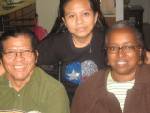At festival, storytellers add a bit of character
They share their love of good tales in tradition-rich state
ERIC AASENPublication Date: March 10, 2012 Page: B01 Section: METRO Zone: STATE Edition: 1
For storytellers, the thrill of telling a tale comes from the hush that cascades over a crowd of fidgety kids. Or the eyes of the audience staring straight at them. Or someone walking up to them, remembering a story they shared years ago.They share their love of good tales in tradition-rich state
ERIC AASENPublication Date: March 10, 2012 Page: B01 Section: METRO Zone: STATE Edition: 1
Elizabeth Ellis knows when she's hooked her audience.
"At the moment when they begin to lean slightly forward in their chairs," she said, "you know that they will go with you pretty much wherever you would like to take them."
There are tall tales and folk tales.
Storytellers are sharing their love of story in
But, really, we are all storytellers. Each of us has a story.
"We tell fewer stories of 'Once upon a time,' but we tell stories like 'Did I tell you about the time I …'" Ellis said. "If you're telling about the date you had last night, you're telling a story.
"Anyone who thinks storytelling is dead hasn't been to a bar lately. Storytelling is alive and well."
'You own that story'
Some of us, though, are masters at spinning a good yarn.
Jacqui Rash, a children's librarian for the Fort Worth Library, once told students the story of Sojourner Truth, the abolitionist and women's rights activist from the 1800s.
Rash was so convincing that some of the students in the audience thought she was indeed Sojourner Truth.
"When you tell a story … you own that story," Rash said. "You make that story yours."
When Rash turned 14, she worked with a missionary, knocking on doors, asking if they could tell Bible stories to kids in backyards. Rash memorized her stories. The missionary wanted her to talk to the kids.
"It was just natural," Rash said. "I liked the response of the crowd. … I thought that was the coolest thing, to go around and tell stories."
At the
"You never know who is going to miss out on a good story because no one took a chance to collect it," she said.
But Rash worries that children are spending more time studying for standardized tests and less time listening to stories by Hans Christian Andersen or the Grimm brothers.
"They're missing out on the culture," Rash said. "They're missing out on the language. And they're missing out on some of the story."
'It becomes real'
In
When Cornish visits schools and juvenile jails, he tells multicultural tales and stories about positive role models.
He explains what they did to overcome adversity. He wants to tell the kids that they can beat the odds, too.
"You use stories to get them past the nose on their face," Cornish said. "You're looking at that kid and he sees your passion. He sees the honesty. It becomes real to him."
Cornish tells the story about Frederick Douglass, the slave who learned to read and write.
"Here we are trying to give you an education and you're squandering it," Cornish tells the kids. "You've got to be thankful for what you have."
Storytelling has a rich tradition in black American culture, said Cornish, who is black. It allows the old and young to come together.
"The most important African-American storytelling does not take place on stage," Cornish said. "It takes place at Big Mama's house when the kids are there, and she's saying what it was like to ride in the front of the bus. … It makes us realize that we have come a long way."
'We're not alone'
When Ellis joined the Dallas Public Library as a librarian, storytelling was the part of the job she liked best.
"Some days, it was the only part I liked," she said. "I tried to spend more time telling stories and less and less time filing catalog cards."
In 1978, after attending a storytelling festival, she decided to quit her job and tell stories.
"We've created a lot of really original characters in
Before psychologists, storytelling was the "people's psychology," Ellis said, as elders used folk tales to help younger generations work through problems.
"Storytelling activates the imagination and helps us … remember that we're not alone," she said.
Storytellers like Ellis usually aren't talking off the cuff. Ellis sketches parts of the story on paper to help her visualize the scenes. Then she tests her stories, telling them to people she meets during her travels.
But the most important part of telling a great story: You have to love it.
"I don't want to waste my time crafting a story I wouldn't love," Ellis said. "That's like going dancing with someone you didn't like."
GO & DO Sharing stories
What:
When: Runs through Sunday
Where:

No comments:
Post a Comment